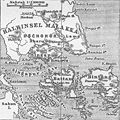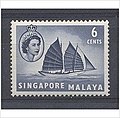Portal:Singapore
 Map of Singapore Singapore, officially the Republic of Singapore, is an island country and city-state in Southeast Asia. The country's territory comprises one main island, 63 satellite islands and islets, and one outlying islet. It is about one degree of latitude (137 kilometres or 85 miles) north of the equator, off the southern tip of the Malay Peninsula, bordering the Strait of Malacca to the west, the Singapore Strait to the south along with the Riau Islands in Indonesia, the South China Sea to the east, and the Straits of Johor along with the State of Johor in Malaysia to the north.
Singapore's history dates back at least eight hundred years, having been a maritime emporium known as Temasek and subsequently a major constituent part of several successive thalassocratic empires. Its contemporary era began in 1819, when Stamford Raffles established Singapore as an entrepôt trading post of the British Empire. In 1867, Singapore came under the direct control of Britain as part of the Straits Settlements. During World War II, Singapore was occupied by Japan in 1942 and returned to British control as a separate Crown colony following Japan's surrender in 1945. Singapore gained self-governance in 1959 and, in 1963, became part of the new federation of Malaysia, alongside Malaya, North Borneo, and Sarawak. Ideological differences led to Singapore's expulsion from the federation two years later; Singapore became an independent sovereign country in 1965. After early years of turbulence and despite lacking natural resources and a hinterland, the nation rapidly developed to become one of the Four Asian Tigers. As a highly developed country, it has one of the highest PPP-adjusted GDP per capita in the world. It is also identified as a tax haven. Singapore is the only country in Asia with a AAA sovereign credit rating from all major rating agencies. It is a major aviation, financial, and maritime shipping hub and has consistently been ranked as one of the most expensive cities to live in for expatriates and foreign workers. Singapore ranks highly in key social indicators: education, healthcare, quality of life, personal safety, infrastructure, and housing, with a home-ownership rate of 88 percent. Singaporeans enjoy one of the longest life expectancies, fastest Internet connection speeds, lowest infant mortality rates, and lowest levels of corruption in the world. It has the third highest population density of any country in the world, although there are numerous green and recreational spaces as a result of urban planning. With a multicultural population and in recognition of the cultural identities of the major ethnic groups within the nation, Singapore has four official languages: English, Malay, Mandarin, and Tamil. English is the common language, with exclusive use in numerous public services. Multi-racialism is enshrined in the constitution and continues to shape national policies in education, housing, and politics. Singapore is a parliamentary republic in the Westminster tradition of unicameral parliamentary government, and its legal system is based on common law. While the country is de jure a multi-party democracy with free elections, the government under the People's Action Party (PAP) wields widespread control and political dominance. The PAP has governed the country continuously since full internal self-government was achieved in 1959, and holds a supermajority in Parliament. One of the five founding members of ASEAN, Singapore is also the headquarters of the Asia-Pacific Economic Cooperation Secretariat, the Pacific Economic Cooperation Council Secretariat, and is the host city of many international conferences and events. Singapore is also a member of the United Nations, the World Trade Organization, the East Asia Summit, the Non-Aligned Movement, and the Commonwealth of Nations. (Full article...)Selected article - Threshold issues are legal requirements in Singapore administrative law that must be satisfied by applicants before their claims for judicial review of acts or decisions of public authorities can be dealt with by the High Court. These include showing that they have standing (locus standi) to bring cases, and that the matters are amenable to judicial review and justiciable by the Court. Depending on the interest that the applicant seeks to represent, standing can be categorized as either private or public standing. Applicants must establish they have private standing if they seek to represent personal interests. In contrast, applicants who seek to represent the interests of a larger group or the public at large must establish public or representative standing. Where private standing is concerned, the Singapore courts have not yet directly addressed the issue of the standing required to obtain a declaration in an administrative law case, but where constitutional claims are concerned the Court of Appeal held that three elements must exist: (1) the applicant must have a real interest in bringing the case, (2) there must be a real controversy between the parties to the case, and (3) a personal right possessed by the applicant must have been violated. The Court also suggested that the same test applied to applications for prerogative orders. The legal position on public standing in administrative law cases is indeterminate as, to date, no applicant has sought to rely on public standing to obtain leave for judicial review. In constitutional law cases, the Court has drawn a distinction between public and private rights, and held that people will not have standing to vindicate public rights unless they have suffered special damage and have genuine private interests to protect or further. (Full article...) Selected picture The DHL Balloon is a giant helium balloon, located on Tan Quee Lan Street in the Downtown Core of Singapore. Sited next to the New 7th Storey Hotel and near Bugis MRT Station, the distinctive red and yellow commercial passenger balloon is the world's largest tethered helium balloon. Read more... General imagesThe following are images from various Singapore-related articles on Wikipedia.
Selected biography -Laurentia Tan Yen Yi BBM PBM (/lɒˈrɛnʃə/ lo-REN-shə; Chinese: 陈雁仪; pinyin: Chén Yànyí, pronounced [tʂə̌n jɛ̂n í]; born 24 April 1979), is a Singaporean para-equestrian competitor. Tan developed cerebral palsy and profound deafness after birth, and moved to the United Kingdom with her parents at the age of three. She took up horse riding aged five years as a form of physiotherapy. She subsequently completed her A-levels at the Mary Hare Grammar School, a residential special school for the deaf, and graduated with an honours degree from Oxford Brookes University in hospitality management and tourism. In March 2007, the Riding for the Disabled Association Singapore (RDA) invited Tan to join the Singapore team for the World Para Dressage Championships at Hartpury College in Hartpury, Gloucester, in England in July that year. At this event, her first international competition, she did well enough to qualify for the 2008 Paralympic Games. In September 2008, at the Hong Kong Olympic Equestrian Centre at Sha Tin, she achieved bronze medals in the Individual Championship and Individual Freestyle Tests (class Ia). These were Singapore's first Paralympic medals and Asia's first equestrian medals at the Paralympic Games. Tan was conferred the Pingat Bakti Masyarakat (Public Service Medal) by the President of Singapore at a ceremony at the Istana Singapore on 20 September 2008. (Full article...) Did you know (auto-generated)
In this month
More did you know -
Selected panoramaSungei Serangoon (Malay for Serangoon River; Chinese: 实龙岗河) is a river in the north-eastern part of Singapore. The 6-kilometre river starts as a canal near Tampines Road, and flows through Hougang, Sengkang, Punggol, Lorong Halus and Pasir Ris, before emptying into the Serangoon Harbour. The river is also known as the Serangoon Estuary. Singapore topicsRelated portalsSoutheast Asia Other Countries Tasks
CategoriesWikiprojectsAssociated WikimediaThe following Wikimedia Foundation sister projects provide more on this subject:
Discover Wikipedia using portals |































































